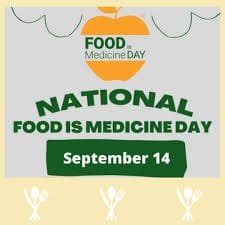National Food Is Medicine Day – September 14, 2022 , history, quotes FAQS
National Food is Medicine Day is celebrated in the United States every year on September 14. Health and food organizations use the day to raise awareness about the barriers to good food in the U.S. The campaign points out that many low-income families always have to deal with obstacles that make it difficult for them to get the healthy foods they need.
The goal of bringing these challenges to the forefront on National Food is Medicine Day is to generate enough buzz to encourage government and private sector entities to collaborate on developing solutions that make it simpler for more people to get healthy food.
HISTORY OF NATIONAL FOOD IS MEDICINE DAY

Malnutrition is a threat that is getting worse quickly. It is a global problem on the same level as poverty and climate change. The World Committee on Food Security has said: “malnutrition in all its forms, including hunger, lack of micronutrients, overweight, and obesity, is a major problem not only in developing countries but also in developed countries.” Malnutrition includes everything from starvation to being overweight.
The main causes of the global burden of disease today are poor diets and the health risks that come with them. Diets that aren’t very good either don’t have enough of certain vitamins, minerals, and fiber, or they have too many calories, saturated fats, salt, and sugar.
In 2010, 10% of the world’s disease burden was caused by unhealthy eating and lack of exercise (measured as the number of years lost due to ill health, disability, or early death). By 2015, six of the top 11 global risk factors, such as being undernourished, having a high body mass index (B.M.I.), and having high cholesterol, were related to diet.
Obesity is usually linked to eating too much, but it can also be caused by not getting enough of certain nutrients. Between 1990 and 2010, the number of adults in sub-Saharan Africa with a high B.M.I. tripled. Countries in the Pacific, the Caribbean, the Middle East, and Central America all have very high rates of overweight and obese adults.
So, all countries around the world need to take action to deal with undernutrition, lack of micronutrients, and overweight and obesity at the same time. On National Food is Medicine Day, the Food Equality Initiative encourages people to join the movement by giving money
to groups that help people get access to healthy food. Subsidizing the extra costs of gluten-free food helps bring down medical costs, lowers the risk of food-related illnesses, and makes it easier for low-income families to eat healthy on a budget.
NATIONAL FOOD IS MEDICINE DAY TIMELINE
1913
The Discovery of Vitamins
A scientist named Elmer McCollum discovers the first vitamins.
1950s
The Birth of Nutritional Science
The study of nutritional science becomes institutionalized as a separate, independent scientific discipline.
2004
Grains Hit a New High
Prices for many staple grains begin to rise.
2016
Cereal Production Improves
The world hits a new record by producing over 2.5 billion metric tons of cereal grains.
HOW TO OBSERVE NATIONAL FOOD IS MEDICINE DAY
Cook a healthy meal
Food is Medicine Day is always a great opportunity to review your diet and restock gluten-free food. Prepare a homemade meal to enjoy alone or with friends. You could also explore new healthy meals to add to your meal menu.
Participate in food hunts
To encourage and educate people about healthy diets, many health agencies run food hunts on this day. You can get involved in a food hunt in your area and you might just end up learning a few healthy diet plans.
Donate to food agencies
With so many factors still hindering millions from getting access to affordable healthy diets, every donation contributes greatly to helping one more person eat good food. Donations will also make it easier for organizations to ship boxes of specialized food to people with food allergies or Celiac disease.
5 INTERESTING FACTS ABOUT FOOD YOU SHOULD KNOW
The popsicle was invented by a kid
It is rumored that in 1905, 11-year-old Frank Epperson left a mixture of soda and water in a cup outside overnight, which froze and became a newfound treat.
.
Raw oysters are eaten alive
Oysters deteriorate so fast that chefs have to serve them very quickly — while they’re still alive.
One hamburger doesn’t equal one cow
According to the “Washington Post,” hamburgers are almost always a mishmash of ingredients from numerous cows.
Ketchup has medicinal properties
Ketchup was once believed to have medicinal qualities that could cure, among other ailments, diarrhea.
Potatoes absorb Wi-Fi signals
Because of their high water content and chemical makeup, potatoes absorb and reflect radio and wireless signals.
WHY NATIONAL FOOD IS MEDICINE DAY IS IMPORTANT
It creates awareness about healthy diets
With busy schedules and endless eateries on every corner, hardly anyone bothers about a homemade meal anymore. Food is Medicine Day helps to bring back the mood of homemade meals. It’s also a good time to highlight the risks associated with an excessive intake of junk food.
It drives attention to the plight of low-income families
For families that depend on weekly paychecks to survive, it’s difficult to maintain a healthy diet amidst the constant price surges of staple food. This day presents an opportunity to outline these challenges and search for ways to make healthy food more affordable.
It highlights the challenges of people with food allergies
People with food allergies often have to buy special versions of food to stay healthy. And these versions are usually more expensive than the normal versions. This day helps to shed some light on the plight of people in this category and how to reduce the burden of getting these special foods.
NATIONAL FOOD IS MEDICINE DAY FAQS
How is food used as medicine?
Food may promote health, depending on what you eat. Studies have shown that a diet full of nutrients in a whole meal may prevent many diseases and even help treat some conditions, such as type 2 diabetes.
Why is food so powerful?
The reward centers of our brains are activated as we eat highly appealing food, like candies. The neurotransmitter, dopamine, has a key role in the brain biology of reward, but dopamine pathways are also involved in many other brain functions.
How does food affect mental health?
When you stick to a diet of healthy food, you’re setting yourself up for fewer mood fluctuations, an overall happier outlook, and an improved ability to focus.



